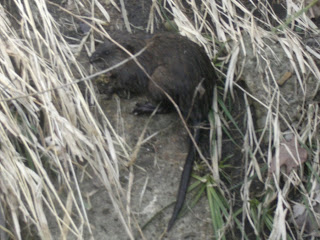

It's a muskrat! Oh, excitement!
The muskrat (Ondatra zibethicus) is one of my favorite local critters. Curiously, muskrats are not closely related to beavers, in spite of the superficial resemblance and similar habits. While they are both rodents, muskrats are most closely allied with voles and lemmings, while beavers' closest relatives are the pocket gophers and kangaroo rats.
I learned only yesterday of the song "Muskrat Love," made popular by The Captain and Tennille in 1976. It seems elicit strong reactions in people - it was a Top 40 hit, but was also placed high on CNN's list of the worst songs in popular music. Apparently you either you love it or it. At this point, frankly, I'm just confused by it.
The utility of muskrats, however, transcends even the music of the mid-seventies. According to the Roman Catholic Archdiocese of Detroit, muskrat is considered "fish" rather than "meat" for the purpose of observing meatless Fridays during Lent. Legend holds that this custom dates back to a priest ministering to trappers in southeast Michigan during the early 1800s who found that trappers' families were going hungry without meat during Lent. The priest reasoned that the aquatic muskrat could be considered "fish" and not "meat," allowing the faithful to obtain needed protein without breaking their Lenten vows. A 1987 opinion by the bishop of Lansing held that this "immemorial custom" was acceptable under canon law; perhaps more importantly, the bishop was unimpressed with the gastronomic value of muskrat, declaring that "anyone who could eat muskrat was doing penance worthy of the greatest of the saints."
1In December 2007, commuters leaving Union Station in downtown Chicago saw otters along the South Branch of the Chicago River.
2Sending a picture of a critter for me to identify constitutes implied oral consent for me to redistribute the picture. This means you, Major League Baseball!



No comments:
Post a Comment